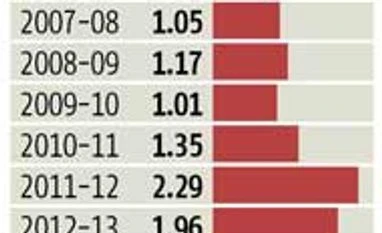Faced with high volatility in the past few weeks, farmers in Gujarat have urged the Forward Markets Commission (FMC) to ban futures trading in castor seed.
In a letter to the commodity derivatives market regulator, farmers’ representative body Bharatiya Kisan Sangh (BKS) said on Tuesday that FMC should ban futures trading in castor seed in case excessive speculative activities witnessed in this counter on commodity exchanges. Castor seed is abundantly traded on the National Commodity & Derivatives Exchange (NCDEX) and Ace Derivatives and Commodity Exchange (Ace).
Average castor seed price jumped 17.83 per cent in October 2014 to Rs 44,000 a tonne in Gujarat spot mandi, compared to Rs 37,553 a tonne in November 2013, data compiled by the Solvent Extractors’ Association showed. During the week to November 28, however, castor seed price declined 3.28 per cent to Rs 44,250 a tonne. Castor seed for delivery in April 2015 jumped 2.4 per cent on Wednesday to trade at Rs 4,812 a quintal on the NCDEX. To curb excessive volatility, the FMC levied five per cent additional margins on both sides (buy or long and sell or short)
“The FMC’s unfavourable action has created panic in the market and favoured multinational companies’ lobby, which is trying to suppress its price. Therefore, a sell side margin of 10-15 per cent should be imposed to further restrict the unscrupulous activities by vested interest of international buyers who sell the produce in forward and keep the price level artificially at a low level so that they can buy the seed at low levels. This will ensure the fall in prices is protected,” said Magan Bhai Patel, chairman of BKS.
Castor is a non-food product and, therefore, the commodity does not have any connections with food inflation. There is hardly any domestic consumption of the derivatives of castor seed - that is castor oil and meal. Therefore, they are exported. Against the agriculture ministry’s forecast of 1.96 million tonnes output, trade sources estimate a 25 per cent decline in castor seed production this year. This is in view of the lower area due to the extended delay in monsoon rainfalls this season and heavy crop losses on unseasonal rainfalls followed by flood in September.In a letter to the commodity derivatives market regulator, farmers’ representative body Bharatiya Kisan Sangh (BKS) said on Tuesday that FMC should ban futures trading in castor seed in case excessive speculative activities witnessed in this counter on commodity exchanges. Castor seed is abundantly traded on the National Commodity & Derivatives Exchange (NCDEX) and Ace Derivatives and Commodity Exchange (Ace).
Average castor seed price jumped 17.83 per cent in October 2014 to Rs 44,000 a tonne in Gujarat spot mandi, compared to Rs 37,553 a tonne in November 2013, data compiled by the Solvent Extractors’ Association showed. During the week to November 28, however, castor seed price declined 3.28 per cent to Rs 44,250 a tonne. Castor seed for delivery in April 2015 jumped 2.4 per cent on Wednesday to trade at Rs 4,812 a quintal on the NCDEX. To curb excessive volatility, the FMC levied five per cent additional margins on both sides (buy or long and sell or short)
“The FMC’s unfavourable action has created panic in the market and favoured multinational companies’ lobby, which is trying to suppress its price. Therefore, a sell side margin of 10-15 per cent should be imposed to further restrict the unscrupulous activities by vested interest of international buyers who sell the produce in forward and keep the price level artificially at a low level so that they can buy the seed at low levels. This will ensure the fall in prices is protected,” said Magan Bhai Patel, chairman of BKS.
Alleging the FMC’s unilateral action in terms of imposition of margins when prices move up benefits multinational companies, BKS said: “Let the market factors of supply-demand determine the fair prices of the castor as farmers would then be free from the clutches of the monopolistic local manufacturers.”
Castor seed’s share in overall turnover of NCDEX at Rs 66,198 crore has shot up to 26.60 per cent in October from 23.5 per cent share in Rs 83,520 crore turnover recorded in September.
The oilseed’s contribution, however, has fallen to 20.80 per cent in the exchange turnover of Rs 49,008 crore up to November 24.
)